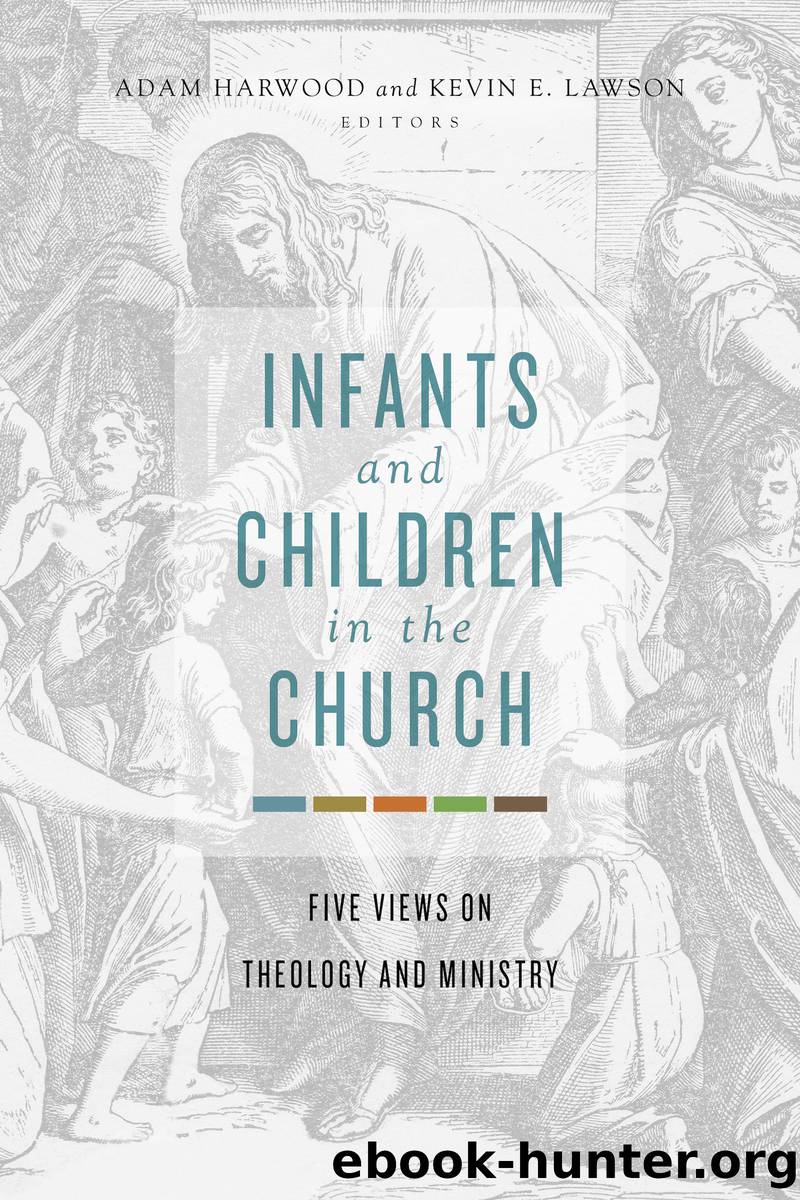Infants and Children in the Church by Harwood Adam;Lawson Kevin E.; & Kevin E. Lawson

Author:Harwood, Adam;Lawson, Kevin E.; & Kevin E. Lawson
Language: eng
Format: epub
Publisher: B&H Publishing Group
Published: 2017-09-13T00:00:00+00:00
23 Lutherâs discussion is profitable for those concerned with the fate of the unbaptized (LW 3:101â7). Jonathan Trigg, commenting on this section, says, âIt is those adults who have contempt for circumcision or baptism who are surely damned.â Baptism in the Theology of Martin Luther (Leiden, Netherlands: Brill, 1994), 41. A question was posed to Thomas Hopko at a Symposium on the Lutheran Confessions at Concordia Theological Seminary, Fort Wayne, about the fate of children baptized with the Modalist-like formula âCreator-Redeemer-Sanctifier.â Hopko, perhaps the leading Eastern Orthodox theologian in the United States at the time, responded in virtual Luther-like fashion: âI have no doubt about the salvation of such children, but I do about those who administer that kind of Baptism.â
24 Jonah Lehrer, âInside the Baby Mind,â The Boston Globe, April 26, 2009, available at http://www.boston.com/âbostonglobe/âideas/âarticles/â2009/â04/â26/âinside_âthe_âbaby_âmind/. All the quotations in this paragraph were taken from this article.
25 James A. Murphy, Kids and Kingdom: The Precarious Presence of Children in the Synoptic Gospels (Eugene, OR: Wipf and Stock, 2013).
26 First John 2:13â14 states, âI am writing to you, little children, because your sins are forgiven for his sake. I am writing to you, fathers, because you know him who is from the beginning. I am writing to you, young men, because you have overcome the evil one. I write to you, children (paidia), because you know the Father. I write to you, fathers, because you know him who is from the beginning. I write to you, young men, because you are strong, and the word of God abides in you, and you have overcome the evil one.â
27 Eighteenth-century Rationalist Lutheran theologians raised arguments against infant baptism and allowed it because its cessation would disrupt society since the rite conferred citizenship. The nineteenth-century Reformed theologian Friedrich Schleiermacher, who strongly influenced Lutheran theologians, held to the same view; however, he attributed to baptism a sacramental effect on the child who could later be brought to faith. For a discussion of this, see David P. Scaer, Infant Baptism in Nineteenth Century Lutheran Theology (Saint Louis, MO: Concordia, 2011).
28 The Small Catechism has six parts: the Ten Commandments, the Apostlesâ Creed, the Lordâs Prayer, Baptism, âHow the Unlearned Should be Taught to Confess,â and the Lordâs Supper.
29 For an overview of the several Lutheran understandings of confirmation, see David P. Scaer, âConfirmation as a Sacramental Rite,â Logia 15.1 (2006): 49â58 and Geoffrey R. Boyle, âConfirmation, Catechesis and Communion: A Historical Survey,â Concordia Theological Quarterly 79 (2015): 121â42.
30 For a lively presentation of the presence of faith in infants at the time of their baptism, see Karl Brinkel, Die Lehre Luthers von der fides infantium bei der Kindertaufe (Berlin, Germany: Evangelische Verlagsanstalt, 1958). Also see the chapter on infant faith in David P. Scaer, Baptism, Confessional Lutheran Dogmatics IX (St. Louis, MO: Luther Academy, 1999), 147â56.
31 For a discussion of how Lutherans wrestled with this issue, see Scaer, Infant Baptism.
32 Lutheran Service Book, 272â74.
33 Lutheran Service Book, 864.
34 For a fair presentation of baptism by a
Download
This site does not store any files on its server. We only index and link to content provided by other sites. Please contact the content providers to delete copyright contents if any and email us, we'll remove relevant links or contents immediately.
Infants and Children in the Church by Harwood Adam;Lawson Kevin E.; & Kevin E. Lawson(233)
Chemical industries exposition by Unknown(202)
On Christian Doctrine by St. Augustine(142)
The Portable Seminary by David Horton(113)
On The Spirit And The Letter by Saint Augustine - St. Augustine(101)
The Work of Theology by Hauerwas Stanley;(90)
grand prix circus manual by Unknown(81)
Keep Calm And Do Your Job 02 by Unknown(79)
Pain That Heals by Martin Israel(74)
manual-es-2.6 by Unknown(69)
The Hidden History of Jesus and the Holy Grail by Laurence Gardner(68)
Urban Legend by Jonathan Green(66)
The Ironic Christian's Companion by Patrick Henry(63)
Discovering the Spirit in the City by Andrew Walker; Aaron Kennedy; Aaron Kennedy(62)
God Is Impassible and Impassioned by Rob Lister(60)
Silk Road Traces: Studies on Syriac Christianity in China and Central Asia by LIT Verlag(60)
In Search of a Non-Dogmatic Theology by Jeffrey W. Robbins(60)
A Body Broken for a Broken People by Moloney Francis J.;(60)
God's Astounding Opinion of You by Ralph Harris(59)
